
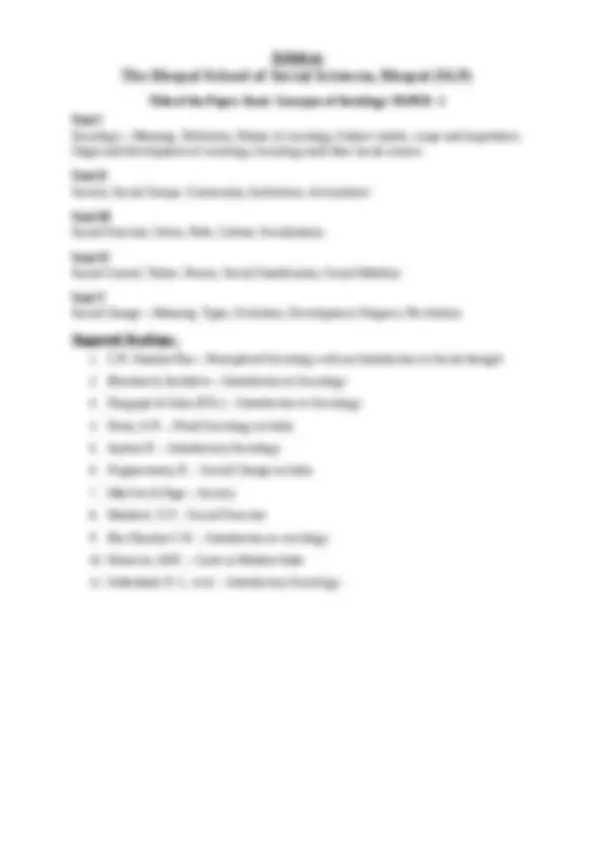
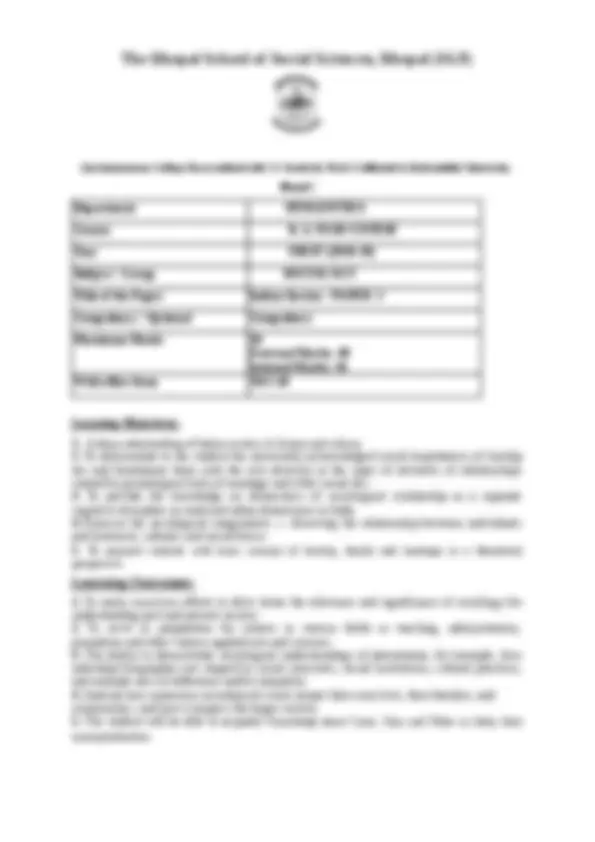
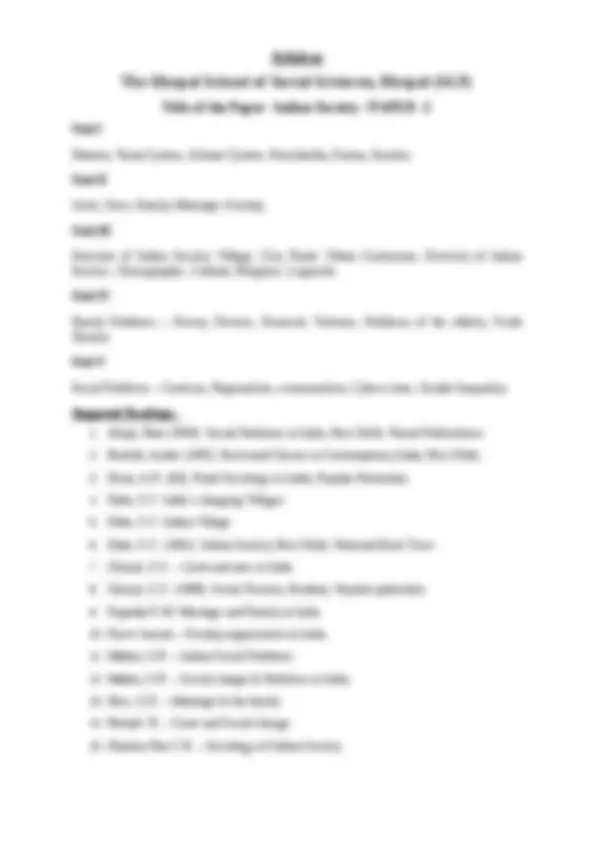
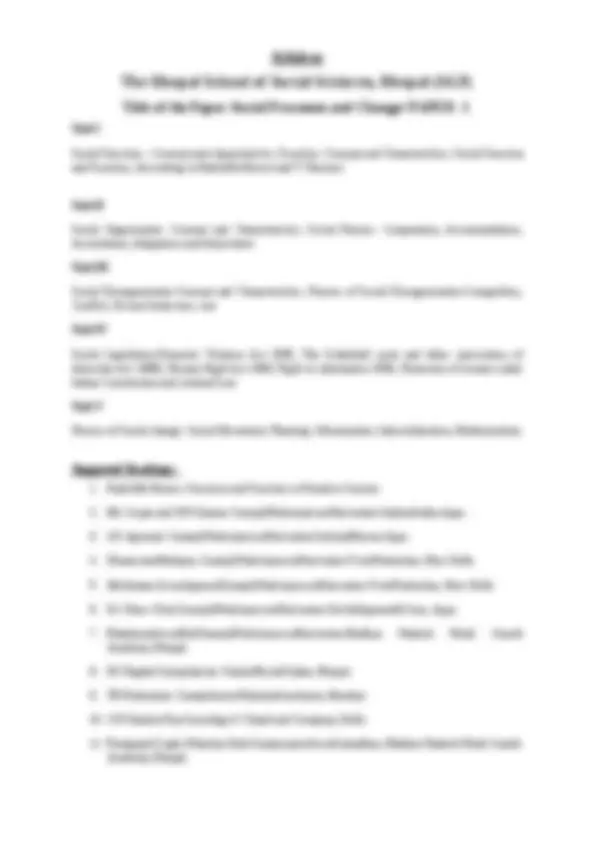
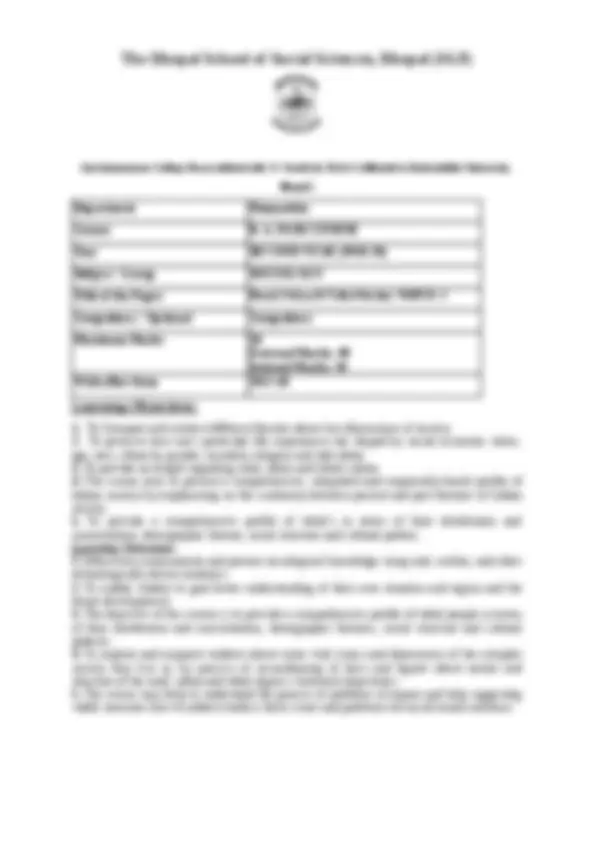
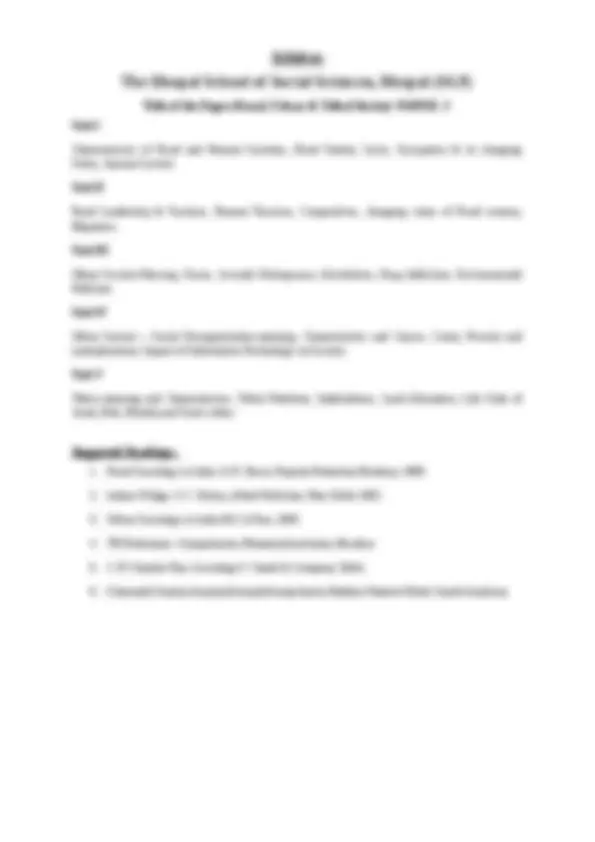


Study with the several resources on Docsity

Earn points by helping other students or get them with a premium plan


Prepare for your exams
Study with the several resources on Docsity

Earn points to download
Earn points by helping other students or get them with a premium plan
Community
Ask the community for help and clear up your study doubts
Discover the best universities in your country according to Docsity users
Free resources
Download our free guides on studying techniques, anxiety management strategies, and thesis advice from Docsity tutors
The syllabus for the sociology course under the ba pass course for the first year at the bhopal school of social sciences. The course includes two papers - basic concepts of sociology (paper-1) and indian society (paper-2). The learning objectives, units, and suggested readings for each paper are outlined.
Typology: Study notes
1 / 10

This page cannot be seen from the preview
Don't miss anything!







(An Autonomous College Reaccredited with ‘A’ Grade by NAAC Affiliated to Barkatullah University, Bhopal ) Department HUMANITIES Course B. A. PASS COURSE Year FIRST (2018-19) Subject / Group SOCIOLOGY Title of the Paper Basic Concepts of Sociology/ PAPER - Compulsory / Optional Compulsory Maximum Marks 50 External Marks: 40 Internal Marks: 10 With effect from 2017-
Learning Objectives:
1. To develop and sensitize in students the sociological knowledge and skills that will enable them to think critically and imaginatively about society and social issues. 2. It is presumed that the student has some familiarity with Indian society by virtue of the fact that he is a member of it and that he has observed and experienced some facets of it. 3. The objective of this course is to introduce students to the basic concepts in the sociology of organizations and the sociology of work. 4. Demonstrate a basic understanding of the academic sociological literature as it relates to contemporary social issues. 5. The major in sociology provides extensive knowledge about culture, social institutions, and everyday interaction as these shape identity, behaviour, social systems.
understanding society.
2. To serve as preparation for careers in various fields as teaching, administration, journalism and other various applied arts and sciences 3. Exercise the sociological imagination — observing the relationship between individuals and historical, cultural, and social forces.
individual biographies are shaped by social structures, social institutions, cultural practices, and multiple axes of difference and/or inequality.
of sociology.
(An Autonomous College Reaccredited with ‘A’ Grade by NAAC Affiliated to Barkatullah University, Bhopal ) Department HUMANITIES Course B. A. PASS COURSE Year FIRST (2018-19) Subject / Group SOCIOLOGY Title of the Paper Indian Society / PAPER - Compulsory / Optional Compulsory Maximum Marks 50 External Marks: 40 Internal Marks: 10 With effect from 2017-
Learning Objectives:
1. A deep understanding of Indian society, its history and culture, 2. To demonstrate to the student the universally acknowledged social importances of kinship ties and familiarize them with the rich diversity in the types of networks of relationships created by genealogical links of marriage and other social ties. 3. To provide the knowledge on distinctness of sociological scholarship as a separate cognitive discipline on rural and urban dimensions in India 4. Exercise the sociological imagination — observing the relationship between individuals and historical, cultural, and social forces. 5. To acquaint students with basic concept of kinship, family and marriage in a theoretical perspective.
1. To make conscious efforts to drive home the relevance and significance of sociology for understanding past and present society. 2. To serve as preparation for careers in various fields as teaching, administration, journalism and other various applied arts and sciences 3. The ability to demonstrate sociological understandings of phenomena, for example, how individual biographies are shaped by social structures, social institutions, cultural practices, and multiple axes of difference and/or inequality. 4. Analyze how numerous sociological events impact their own lives, their families, and communities, and how it impacts the larger society. 5. The student will be able to acquaint Knowledge about Caste, Class and Tribes in India, their conceptualization.
Unit I
Dharma, Varna System, Ashram System, Purushartha, Karma, Sanskar.
Unit II
Caste, Class, Family, Marriage, Kinship.
Unit III
Structure of Indian Society, Village, City, Rural- Urban Continuum, Diversity of Indian Society – Demographic, Cultural, Religious, Linguistic.
Unit IV
Family Problems – Dowry, Divorce, Domestic Violence, Problems of the elderly, Youth Tension.
Unit V
Social Problems – Casteism, Regionalism, communalism, Cyber-crime, Gender Inequality.
Suggested Readings:
Department Humanities Course B. A. PASS COURSE Year SECOND YEAR (2018-19) Subject / Group SOCIOLOGY Title of the Paper Social Processes and Change / PAPER - Compulsory / Optional Compulsory Maximum Marks 50 External Marks: 40 Internal Marks: 10 With effect from 2017-
of social institutions.
Indian context, their conceptualization.
Unit I
Social Structure – Concept and characteristics, Function- Concept and Characteristics, Social Structure and Function, (According to Radcliffe-Brown and T. Parsons)
Unit II
Social Organization- Concept and Characteristics, Social Process- Cooperation, Accommodation, Assimilation, Adaptation and Adjustment
Unit III
Social Disorganization-Concept and Characteristics, Process of Social Disorganization-Competition, Conflict, Deviant behaviour, war
Unit IV
Social Legislation-Domestic Violence Act 2005, The Scheduled caste and tribes (prevention of Atrocities Act 1989), Human Right Act 1993, Right to information 2005, Protection of women under Indian Constitution and criminal Law
Unit V
Process of Social change- Social Movement, Planning, Urbanization, Industrialization, Modernization
Suggested Readings:
Title of the Paper-Rural, Urban & Tribal Society/ PAPER - Unit I
Characteristics of Rural and Peasant Societies, Rural Family, Caste, Occupation & its changing Status, Jajmani System
Unit II
Rural Leadership & Factions, Peasant Tensions, Cooperatives, changing status of Rural women, Migration
Unit III
Urban Society-Housing, Slums, Juvenile Delinquency, Alcoholism, Drug Addiction, Environmental Pollution
Unit IV
Urban Society – Social Disorganization-meaning, Characteristics and Causes, Crime, Poverty and unemployment, Impact of Information Technology on Society.
Unit V
Tribes-meaning and Characteristics, Tribal Problems, Indebtedness, Land Alienation, Life Style of Gond, Bhil, Bhilala and Korku tribes.
Suggested Readings: